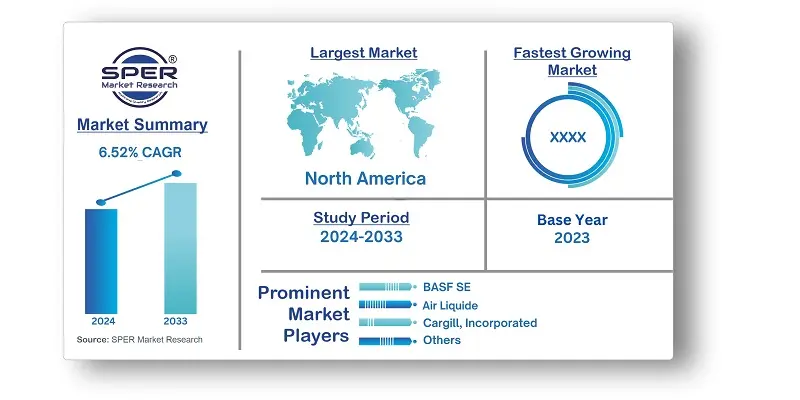
Nutraceutical Excipients Market Growth, Trends, Size, Demand, Challenges and Future Outlook
Nutraceutical Excipients Market Growth, Size, Trends Analysis - By Type, By End Product - Regional Outlook, Competitive Strategies and Segment Forecast to 2033
| Published: Jan-2025 | Report ID: NUTR2502 | Pages: 1 - 263 | Formats*: |
| Category : Nutraceuticals | |||
- The world's top taste and nutrition company, Kerry Group Plc., said in February 2022 that it has extended its production capabilities, technology portfolio, and expertise through two major biotechnology acquisitions. The business has revealed that it has purchased Enmex, a Mexican enzyme manufacturer, and c-LEcta, a premier biotechnology innovation company. Precision fermentation, improved bioprocessing, and biotransformation are the areas of expertise for c-LEcta, a leading biotechnology innovation firm. Additionally, Enmex is a reputable enzyme company with headquarters in Mexico that offers a variety of bio-process solutions for the food, beverage, and animal nutrition industries.
- The French company Roquette stated in 2023 that it was expanding its unmatched range of solutions for moisture-sensitive active pharmaceutical and nutraceutical components by adding three new excipient grades.

- Growing Demand for Dietary Supplements and Functional Foods: As consumers' awareness of health and wellness grows, so does the demand for dietary supplements and functional foods. As more individuals learn about the advantages of nutritional supplements for general health, the market for nutraceutical excipients is growing.
- Growing Chronic Illness Prevalence and Population Aging: The need for preventative healthcare solutions is increased by the aging population and the rising prevalence of chronic diseases. Chronic conditions like diabetes, heart disease, and obesity must be controlled with dietary changes. With 2 billion people worldwide predicted to be 60 and older by 2050, there will be a greater need for nutraceutical products that promote lifespan and health, which will expand the market for excipients.

| Report Metric | Details |
| Market size available for years | 2020-2033 |
| Base year considered | 2023 |
| Forecast period | 2024-2033 |
| Segments covered | By Type, By End Product. |
| Regions covered | North America, Asia-Pacific, Latin America, Middle East & Africa and Europe. |
| Companies Covered | Air Liquide, Ashland, Associated British Foods plc, Azelis Group, BASF SE, Biogrund GmbH, Cargill, Incorporated, Hilmar Cheese Company, Inc, IMCD, Ingredion, Innophos, International Flavors & Fragrances, Inc. |
- Nutraceutical Manufacturers
- Excipients Manufacturers and Suppliers
- Pharmaceutical Companies
- Food & Beverage Companies
- Contract Research Organizations (CROs)
- Regulatory Bodies
- Raw Material Suppliers
- Research Institutes and Universities
- Packaging Companies
| By Type: | |
| By End Product: |
- Global Nutraceutical Excipients Market Size (FY’2024-FY’2033)
- Overview of Global Nutraceutical Excipients Market
- Segmentation of Global Nutraceutical Excipients Market By Type (Fillers, Diluents, Coating Agents, Binder, Disintegrants)
- Segmentation of Global Nutraceutical Excipients Market By End Product (Protein and Amino Acids, Vitamin, Minerals, Omega 3 Fatty Acids, Others)
- Statistical Snap of Global Nutraceutical Excipients Market
- Expansion Analysis of Global Nutraceutical Excipients Market
- Problems and Obstacles in Global Nutraceutical Excipients Market
- Competitive Landscape in the Global Nutraceutical Excipients Market
- Impact of COVID-19 and Demonetization on Global Nutraceutical Excipients Market
- Details on Current Investment in Global Nutraceutical Excipients Market
- Competitive Analysis of Global Nutraceutical Excipients Market
- Prominent Players in the Global Nutraceutical Excipients Market
- SWOT Analysis of Global Nutraceutical Excipients Market
- Global Nutraceutical Excipients Market Future Outlook and Projections (FY’2024-FY’2033)
- Recommendations from Analyst
1.1. Scope of the report1.2. Market segment analysis
2.1. Research data source
2.1.1. Secondary Data2.1.2. Primary Data2.1.3. SPERs internal database2.1.4. Premium insight from KOLs
2.2. Market size estimation
2.2.1. Top-down and Bottom-up approach
2.3. Data triangulation
4.1. Driver, Restraint, Opportunity and Challenges analysis
4.1.1. Drivers4.1.2. Restraints4.1.3. Opportunities4.1.4. Challenges
4.2. COVID-19 Impacts of the Global Nutraceutical Excipients Market.
5.1. SWOT Analysis
5.1.1. Strengths5.1.2. Weaknesses5.1.3. Opportunities5.1.4. Threats
5.2. PESTEL Analysis
5.2.1. Political Landscape5.2.2. Economic Landscape5.2.3. Social Landscape5.2.4. Technological Landscape5.2.5. Environmental Landscape5.2.6. Legal Landscape
5.3. PORTERs Five Forces
5.3.1. Bargaining power of suppliers5.3.2. Bargaining power of buyers5.3.3. Threat of Substitute5.3.4. Threat of new entrant5.3.5. Competitive rivalry
5.4. Heat Map Analysis
6.1. Global Nutraceutical Excipients Market Manufacturing Base Distribution, Sales Area, Product Type6.2. Mergers & Acquisitions, Partnerships, Product Launch, and Collaboration in Global Nutraceutical Excipients Market
7.1. Global Nutraceutical Excipients Market Size, Share and Forecast, By Type, 2020-20267.2. Global Nutraceutical Excipients Market Size, Share and Forecast, By Type, 2027-20337.3. Fillers7.4. Diluents7.5. Coating Agents7.6. Binder7.7. Disintegrants7.8. Colorants & Sweeteners7.9. Flavoring Agents7.10. Lubricants7.11. Others
8.1. Global Nutraceutical Excipients Market Size, Share and Forecast, By End Product, 2020-20268.2. Global Nutraceutical Excipients Market Size, Share and Forecast, By End Product, 2027-20338.3. Protein and Amino Acids8.4. Vitamin8.5. Minerals8.6. Omega 3 Fatty Acids8.7. Others
9.1. Global Nutraceutical Excipients Market Size and Market Share
10.1. Global Nutraceutical Excipients Market Size and Market Share By Region (2020-2026)10.2. Global Nutraceutical Excipients Market Size and Market Share By Region (2027-2033)10.3. Asia-Pacific
10.3.1. Australia10.3.2. China10.3.3. India10.3.4. Japan10.3.5. South Korea10.3.6. Rest of Asia-Pacific
10.4. Europe
10.4.1. France10.4.2. Germany10.4.3. Italy10.4.4. Spain10.4.5. United Kingdom10.4.6. Rest of Europe
10.5. Middle East and Africa
10.5.1. Kingdom of Saudi Arabia10.5.2. United Arab Emirates10.5.3. Qatar10.5.4. South Africa10.5.5. Egypt10.5.6. Morocco10.5.7. Nigeria10.5.8. Rest of Middle-East and Africa
10.6. North America
10.6.1. Canada10.6.2. Mexico10.6.3. United States
10.7. Latin America
10.7.1. Argentina10.7.2. Brazil10.7.3. Rest of Latin America
11.1. Air Liquide
11.1.1. Company details11.1.2. Financial outlook11.1.3. Product summary11.1.4. Recent developments
11.2. Ashland
11.2.1. Company details11.2.2. Financial outlook11.2.3. Product summary11.2.4. Recent developments
11.3. Associated British Foods plc
11.3.1. Company details11.3.2. Financial outlook11.3.3. Product summary11.3.4. Recent developments
11.4. Azelis Group
11.4.1. Company details11.4.2. Financial outlook11.4.3. Product summary11.4.4. Recent developments
11.5. BASF SE
11.5.1. Company details11.5.2. Financial outlook11.5.3. Product summary11.5.4. Recent developments
11.6. Biogrund GmbH
11.6.1. Company details11.6.2. Financial outlook11.6.3. Product summary11.6.4. Recent developments
11.7. Cargill, Incorporated
11.7.1. Company details11.7.2. Financial outlook11.7.3. Product summary11.7.4. Recent developments
11.8. Hilmar Cheese Company, Inc
11.8.1. Company details11.8.2. Financial outlook11.8.3. Product summary11.8.4. Recent developments
11.9. IMCD
11.9.1. Company details11.9.2. Financial outlook11.9.3. Product summary11.9.4. Recent developments
11.10. Ingredion
11.10.1. Company details11.10.2. Financial outlook11.10.3. Product summary11.10.4. Recent developments
11.11. Innophos
11.11.1. Company details11.11.2. Financial outlook11.11.3. Product summary11.11.4. Recent developments
11.12. International Flavors & Fragrances, Inc
11.12.1. Company details11.12.2. Financial outlook11.12.3. Product summary11.12.4. Recent developments
11.13. Others
SPER Market Research’s methodology uses great emphasis on primary research to ensure that the market intelligence insights are up to date, reliable and accurate. Primary interviews are done with players involved in each phase of a supply chain to analyze the market forecasting. The secondary research method is used to help you fully understand how the future markets and the spending patterns look likes.
The report is based on in-depth qualitative and quantitative analysis of the Product Market. The quantitative analysis involves the application of various projection and sampling techniques. The qualitative analysis involves primary interviews, surveys, and vendor briefings. The data gathered as a result of these processes are validated through experts opinion. Our research methodology entails an ideal mixture of primary and secondary initiatives.



Frequently Asked Questions About This Report
PLACE AN ORDER
Year End Discount
Sample Report
Pre-Purchase Inquiry
NEED CUSTOMIZATION?
Request CustomizationCALL OR EMAIL US
100% Secure Payment






Related Reports
Our Global Clients
Our data-driven insights have influenced the strategy of 200+ reputed companies across the globe.






















